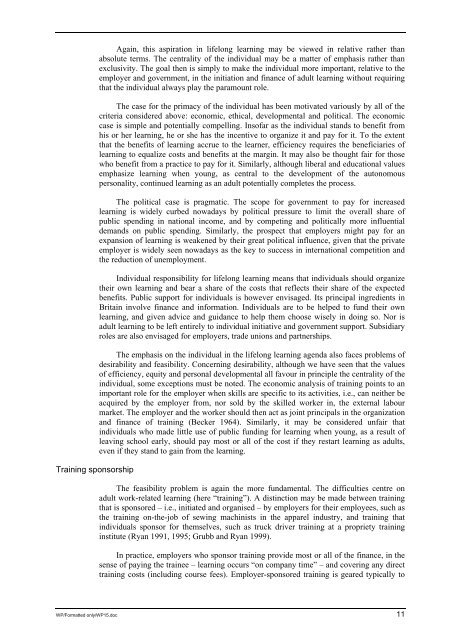Lifelong learning - International Labour Organization
Lifelong learning - International Labour Organization
Lifelong learning - International Labour Organization
Create successful ePaper yourself
Turn your PDF publications into a flip-book with our unique Google optimized e-Paper software.
Training sponsorship<br />
Again, this aspiration in lifelong <strong>learning</strong> may be viewed in relative rather than<br />
absolute terms. The centrality of the individual may be a matter of emphasis rather than<br />
exclusivity. The goal then is simply to make the individual more important, relative to the<br />
employer and government, in the initiation and finance of adult <strong>learning</strong> without requiring<br />
that the individual always play the paramount role.<br />
The case for the primacy of the individual has been motivated variously by all of the<br />
criteria considered above: economic, ethical, developmental and political. The economic<br />
case is simple and potentially compelling. Insofar as the individual stands to benefit from<br />
his or her <strong>learning</strong>, he or she has the incentive to organize it and pay for it. To the extent<br />
that the benefits of <strong>learning</strong> accrue to the learner, efficiency requires the beneficiaries of<br />
<strong>learning</strong> to equalize costs and benefits at the margin. It may also be thought fair for those<br />
who benefit from a practice to pay for it. Similarly, although liberal and educational values<br />
emphasize <strong>learning</strong> when young, as central to the development of the autonomous<br />
personality, continued <strong>learning</strong> as an adult potentially completes the process.<br />
The political case is pragmatic. The scope for government to pay for increased<br />
<strong>learning</strong> is widely curbed nowadays by political pressure to limit the overall share of<br />
public spending in national income, and by competing and politically more influential<br />
demands on public spending. Similarly, the prospect that employers might pay for an<br />
expansion of <strong>learning</strong> is weakened by their great political influence, given that the private<br />
employer is widely seen nowadays as the key to success in international competition and<br />
the reduction of unemployment.<br />
Individual responsibility for lifelong <strong>learning</strong> means that individuals should organize<br />
their own <strong>learning</strong> and bear a share of the costs that reflects their share of the expected<br />
benefits. Public support for individuals is however envisaged. Its principal ingredients in<br />
Britain involve finance and information. Individuals are to be helped to fund their own<br />
<strong>learning</strong>, and given advice and guidance to help them choose wisely in doing so. Nor is<br />
adult <strong>learning</strong> to be left entirely to individual initiative and government support. Subsidiary<br />
roles are also envisaged for employers, trade unions and partnerships.<br />
The emphasis on the individual in the lifelong <strong>learning</strong> agenda also faces problems of<br />
desirability and feasibility. Concerning desirability, although we have seen that the values<br />
of efficiency, equity and personal developmental all favour in principle the centrality of the<br />
individual, some exceptions must be noted. The economic analysis of training points to an<br />
important role for the employer when skills are specific to its activities, i.e., can neither be<br />
acquired by the employer from, nor sold by the skilled worker in, the external labour<br />
market. The employer and the worker should then act as joint principals in the organization<br />
and finance of training (Becker 1964). Similarly, it may be considered unfair that<br />
individuals who made little use of public funding for <strong>learning</strong> when young, as a result of<br />
leaving school early, should pay most or all of the cost if they restart <strong>learning</strong> as adults,<br />
even if they stand to gain from the <strong>learning</strong>.<br />
The feasibility problem is again the more fundamental. The difficulties centre on<br />
adult work-related <strong>learning</strong> (here “training”). A distinction may be made between training<br />
that is sponsored – i.e., initiated and organised – by employers for their employees, such as<br />
the training on-the-job of sewing machinists in the apparel industry, and training that<br />
individuals sponsor for themselves, such as truck driver training at a propriety training<br />
institute (Ryan 1991, 1995; Grubb and Ryan 1999).<br />
In practice, employers who sponsor training provide most or all of the finance, in the<br />
sense of paying the trainee – <strong>learning</strong> occurs “on company time” – and covering any direct<br />
training costs (including course fees). Employer-sponsored training is geared typically to<br />
WP/Formatted only/WP15.doc 11

















